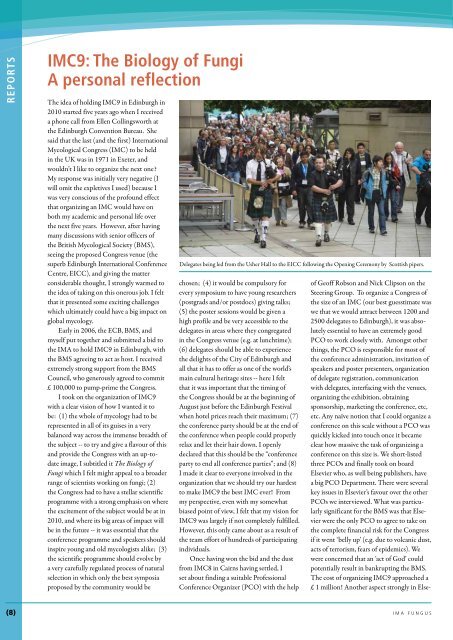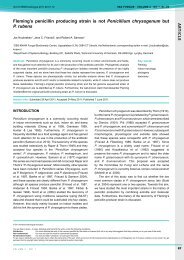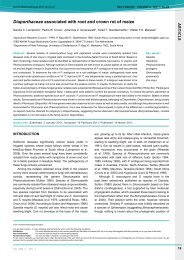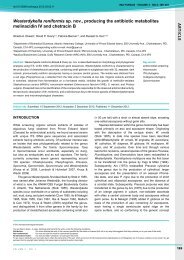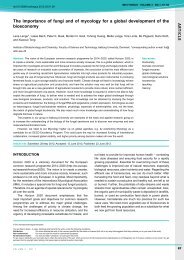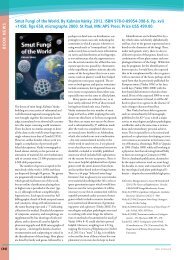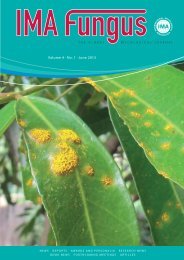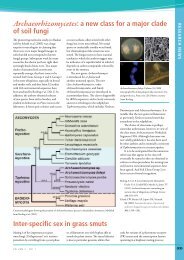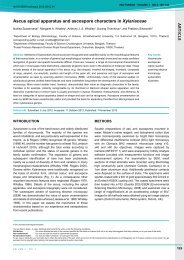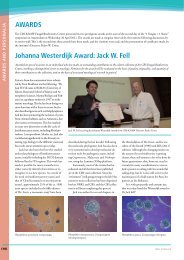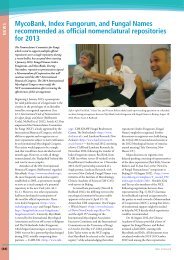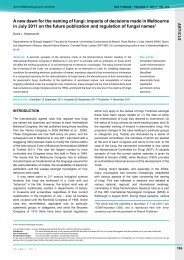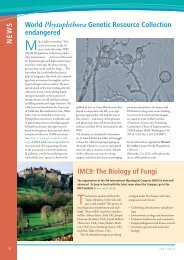Volume 1 · No. 2 · December 2010 V o lu m e 1 · N o ... - IMA Fungus
Volume 1 · No. 2 · December 2010 V o lu m e 1 · N o ... - IMA Fungus
Volume 1 · No. 2 · December 2010 V o lu m e 1 · N o ... - IMA Fungus
You also want an ePaper? Increase the reach of your titles
YUMPU automatically turns print PDFs into web optimized ePapers that Google loves.
REPORTS<br />
IMC9: The Biology of Fungi<br />
A personal reflection<br />
The idea of holding IMC9 in Edinburgh in<br />
<strong>2010</strong> started five years ago when I received<br />
a phone call from Ellen Collingsworth at<br />
the Edinburgh Convention Bureau. She<br />
said that the last (and the first) International<br />
Mycological Congress (IMC) to be held<br />
in the UK was in 1971 in Exeter, and<br />
wouldn’t I like to organize the next one?<br />
My response was initially very negative (I<br />
will omit the expletives I used) because I<br />
was very conscious of the profound effect<br />
that organizing an IMC would have on<br />
both my academic and personal life over<br />
the next five years. However, after having<br />
many discussions with senior officers of<br />
the British Mycological Society (BMS),<br />
seeing the proposed Congress venue (the<br />
superb Edinburgh International Conference<br />
Centre, EICC), and giving the matter<br />
considerable thought, I strongly warmed to<br />
the idea of taking on this onerous job. I felt<br />
that it presented some exciting challenges<br />
which ultimately could have a big impact on<br />
global mycology.<br />
Early in 2006, the ECB, BMS, and<br />
myself put together and submitted a bid to<br />
the <strong>IMA</strong> to hold IMC9 in Edinburgh, with<br />
the BMS agreeing to act as host. I received<br />
extremely strong support from the BMS<br />
Council, who generously agreed to commit<br />
£ 100,000 to pump-prime the Congress.<br />
I took on the organization of IMC9<br />
with a clear vision of how I wanted it to<br />
be: (1) the whole of mycology had to be<br />
represented in all of its guises in a very<br />
balanced way across the immense breadth of<br />
the subject -- to try and give a flavour of this<br />
and provide the Congress with an up-todate<br />
image, I subtitled it The Biology of<br />
Fungi which I felt might appeal to a broader<br />
range of scientists working on fungi; (2)<br />
the Congress had to have a stellar scientific<br />
programme with a strong emphasis on where<br />
the excitement of the subject would be at in<br />
<strong>2010</strong>, and where its big areas of impact will<br />
be in the future -- it was essential that the<br />
conference programme and speakers should<br />
inspire young and old mycologists alike; (3)<br />
the scientific programme should evolve by<br />
a very carefully regulated process of natural<br />
selection in which only the best symposia<br />
proposed by the community would be<br />
Delegates being led from the Usher Hall to the EICC following the Opening Ceremony by Scottish pipers.<br />
chosen; (4) it would be compulsory for<br />
every symposium to have young researchers<br />
(postgrads and/or postdocs) giving talks;<br />
(5) the poster sessions would be given a<br />
high profile and be very accessible to the<br />
delegates in areas where they congregated<br />
in the Congress venue (e.g. at <strong>lu</strong>nchtime);<br />
(6) delegates should be able to experience<br />
the delights of the City of Edinburgh and<br />
all that it has to offer as one of the world’s<br />
main cultural heritage sites -- here I felt<br />
that it was important that the timing of<br />
the Congress should be at the beginning of<br />
August just before the Edinburgh Festival<br />
when hotel prices reach their maximum; (7)<br />
the conference party should be at the end of<br />
the conference when people could properly<br />
relax and let their hair down. I openly<br />
declared that this should be the “conference<br />
party to end all conference parties”; and (8)<br />
I made it clear to everyone involved in the<br />
organization that we should try our hardest<br />
to make IMC9 the best IMC ever! From<br />
my perspective, even with my somewhat<br />
biased point of view, I felt that my vision for<br />
IMC9 was largely if not completely fulfilled.<br />
However, this only came about as a result of<br />
the team effort of hundreds of participating<br />
individuals.<br />
Once having won the bid and the dust<br />
from IMC8 in Cairns having settled, I<br />
set about finding a suitable Professional<br />
Conference Organizer (PCO) with the help<br />
of Geoff Robson and Nick Clipson on the<br />
Steering Group. To organize a Congress of<br />
the size of an IMC (our best guesstimate was<br />
we that we would attract between 1200 and<br />
2500 delegates to Edinburgh), it was abso<strong>lu</strong>tely<br />
essential to have an extremely good<br />
PCO to work closely with. Amongst other<br />
things, the PCO is responsible for most of<br />
the conference administration, invitation of<br />
speakers and poster presenters, organization<br />
of delegate registration, communication<br />
with delegates, interfacing with the venues,<br />
organizing the exhibition, obtaining<br />
sponsorship, marketing the conference, etc,<br />
etc. Any naïve notion that I could organize a<br />
conference on this scale without a PCO was<br />
quickly kicked into touch once it became<br />
clear how massive the task of organizing a<br />
conference on this size is. We short-listed<br />
three PCOs and finally took on board<br />
Elsevier who, as well being publishers, have<br />
a big PCO Department. There were several<br />
key issues in Elsevier’s favour over the other<br />
PCOs we interviewed. What was particularly<br />
significant for the BMS was that Elsevier<br />
were the only PCO to agree to take on<br />
the complete financial risk for the Congress<br />
if it went ‘belly up’ (e.g. due to volcanic dust,<br />
acts of terrorism, fears of epidemics). We<br />
were concerned that an ‘act of God’ could<br />
potentially result in bankrupting the BMS.<br />
The cost of organizing IMC9 approached a<br />
£ 1 million! Another aspect strongly in Else-<br />
(8)<br />
<br />
i m a f U N G U S


